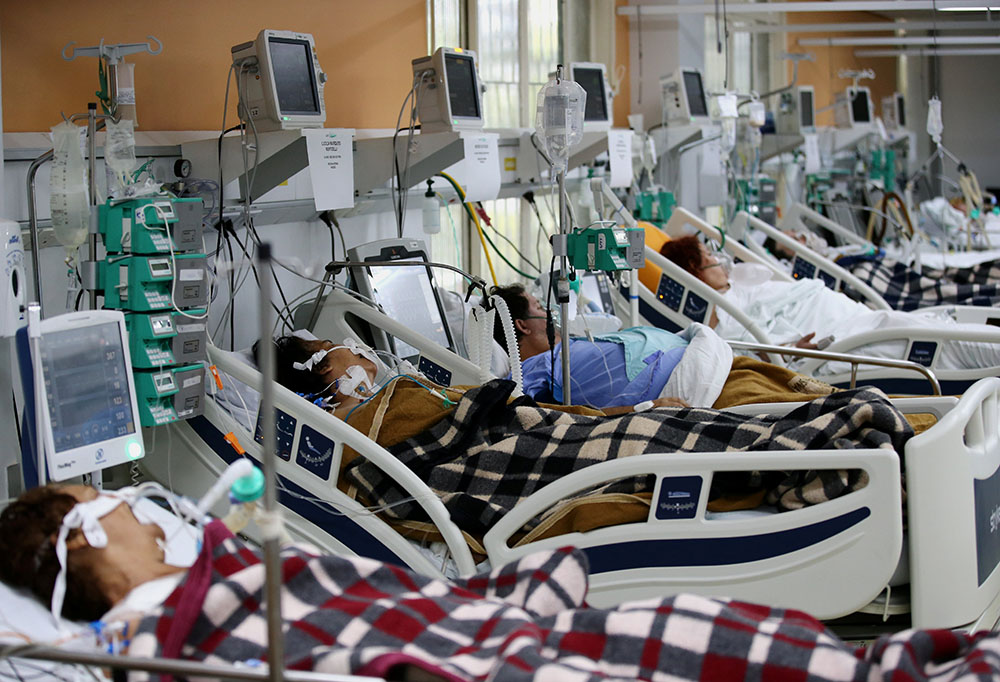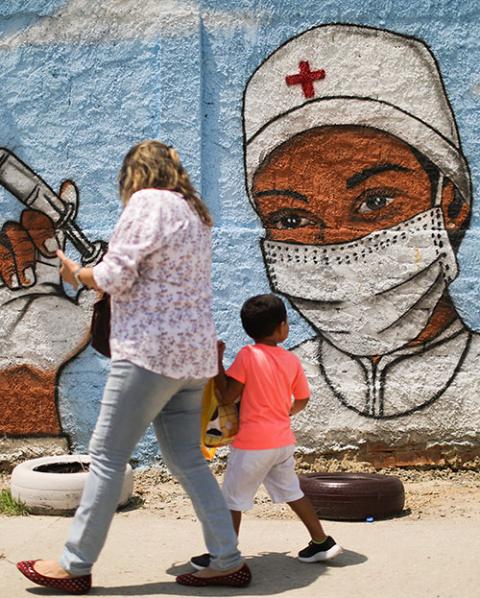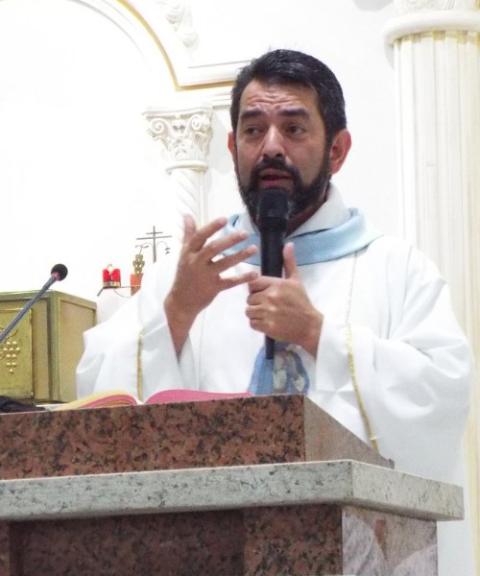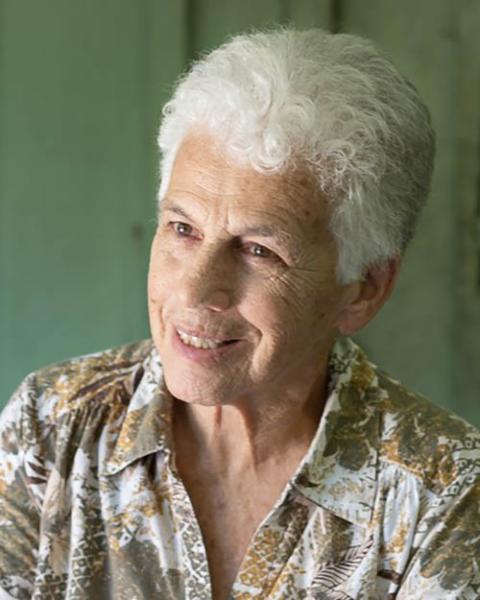
Patients in the emergency room of the Nossa Senhora da Conceição hospital in Porto Alegre, Brazil March 11. The emergency room is overcrowded because of the spike in COVID-19 cases. (CNS/Reuters/Diego Vara)
A second wave of COVID-19 infections has swept Brazil over the past few months, taking the average number of daily deaths to more than 2,500 and causing the collapse of the health care system in several cities.
As the crisis grows, Catholic Church leaders face great challenges in helping those in need and in fighting pandemic denialism, which is often supported by the man many blame for the chaos in the country, President Jair Bolsonaro.
Brazil counts more than 313,000 dead and 12.5 million confirmed cases of the disease. The pandemic rapidly worsened after a new strain of the virus, more contagious and lethal, developed in the Amazonian city of Manaus at the end of 2020.

A woman and child walk past a painting on a wall in Rio de Janeiro March 12 during the COVID-19 pandemic. (CNS/Reuters/Pilar Olivares)
"Unfortunately, many Catholics are influenced by political groups that don't have a critical opinion regarding that state of affairs," Fr. Geraldino de Proença, from the Apucarana Diocese, told NCR. "Christians in general are very susceptible now to fake news about the pandemic in Brazil."
The new wave has left hospitals in 19 state capitals operating almost at full capacity. Supplies of oxygen and of medicines used for the intubation of patients are already lacking in some regions. Even funeral services are reaching the limit of what's possible in large cities like São Paulo.
Despite such issues, a recent survey showed that 22% of Brazilians reject the idea of a federally imposed lockdown to contain the spread of the virus, a lockdown that scientists say is urgently needed. The numbers resonate to a certain degree with the denialist attitude that Bolsonaro has shown since the beginning of the pandemic.
Bolsonaro has always opposed the adoption of social distancing measures and has frequently criticized state governors and city mayors who have decreed partial lockdowns.
He repeatedly failed to wear a face mask in public events, deliberately provoked gatherings of his supporters and put in doubt the effectivity of the Chinese vaccine CoronaVac.
Above all, Bolsonaro failed to establish a coordinated policy to fight the pandemic, something that would have been crucial, according to experts.
De Proença is a member of the unofficial groups Padres da Caminhada ("The Walking Priests," in Portuguese) and Padres contra o Fascismo ("Priests against Fascism"), which include a large part of Brazil's more progressive clergy members.

Fr. Geraldino de Proença, from the Diocese of Apucarana, Brazil (Courtesy of Geraldino de Proença)
The groups issued a joint statement in early March denouncing the "contempt [for the Brazilian population] shown by the president of the republic and his allied authorities" and the continuous "science denialism" promoted by Bolsonaro.
The document also mentioned the deaths of 65 priests and more than 1,400 infected members of the clergy. The priests concluded the letter by calling for vaccines for everyone.
"It's up to the church to alert the people to what's going on. Some people say that the church shouldn't meddle in politics, but it's not about party politics. We're defending life," said de Proença.
Indeed, the church has been trying to denounce the government's mismanagement of the pandemic in different fronts. In 2020, the National Conference of Bishops of Brazil (known as CNBB in Portuguese) joined major civic organizations, like Brazil's Order of Attorneys (the Brazilian Bar Association) and the Brazilian Society for Science Progress, in a so-called Pact for Life, an initiative to pressure the authorities to take control of the pandemic.
Last month, the signatories of the pact released a harsh statement urging the government to "staunch the escalation of deaths." The title of the letter, "The people cannot pay with their lives!", made direct reference to Bolsonaro's alleged ineptitude.
"The inefficiency of the Federal Government, which is primarily responsible for the tragedy we are currently going through, is notorious. Governors and mayors cannot be accomplices in this show of contempt for human life," the document said.
The letter, which is co-signed by Belo Horizonte Archbishop Walmor Oliveira de Azevedo, the conference's president, emphasizes the need for the Brazilian population to be vaccinated quickly.
Since mid-2020, Bolsonaro has shown a critical attitude toward the vaccines and failed to negotiate with pharmaceutical companies for the early acquisition of doses. Now, vaccination in Brazil is progressing very slowly and only 15.5 million people have received at least one shot. The country has a population of 211 million people.
The statement also urges the other branches of the state to assume as much control as possible of the management of the crisis and calls on society to take the necessary precautionary measures.
Advertisement
"CNBB's manifestations have always tried to bring hope and conciliation, but the most recent one has a clear note of denouncement, considering the [government's] lack of responsibility," said Carlos Moura, a lawyer and longtime member of the bishops' committee on justice and peace issues.
It seems to be a hard task to find the appropriate tone in such statements.
On the one hand, the church cannot be silent and pretend that Bolsonaro's government is adequately working to end the pandemic. On the other, it can't be too critical, because a considerable part of his constituency — about 30% of Brazilians support him — is Catholic.
"The church doesn't want to engage in ideological disputes," said Belo Horizonte Auxiliary Bishop Joaquim Giovanni Mol, president of the bishops' communications committee.
"In the current atmosphere, it wouldn't be helpful," Mol told NCR. "You can't convince someone who's already convinced of something."
Instead of stressing the Bolsonaro administration's many faults, the bishops have been focusing on concrete measures to help the poor and on the continuous communication of the adequate attitude to halt the spread of the virus.
"Maybe this way, people begin to understand that there's a lack of national coordination in the current crisis," said Mol. "It's a monumental effort to keep spiritually nurturing the people and to help them to realize how the country should be protecting their lives."

St. Joseph Sr. Jean Ann Bellini, national coordinator of the Brazilian bishops' land pastoral commission (Courtesy of Jean Ann Bellini)
U.S.-born St. Joseph Sr. Jean Ann Bellini, national coordinator of the bishops' land pastoral commission, argued that the Brazilian church is active on several social fronts through its ministries and has been working to fight the consequences of the pandemic in all of them.
"The Catholic social ministries not only directly contribute to find solutions for different social issues, but also publicly denounce them," she told NCR. "That's a way the church has to concretely defend life and change the people's minds."
Catholic congregations across the country have lately intensified a great variety of relief services, which are accompanied by an effort to raise consciousness on the pandemic, explained Messengers of Divine Love Sr. Maria Inês Ribeiro, who leads Brazil's conference for members of religious orders.
"The disorganization of the government contributes to increase denialism among some people," she told NCR. "But our actions of relief show that we think differently. We've been mobilizing all our teams to disseminate information on the disease."
Direct action to help people impacted by the pandemic crisis also helps to pressure the government and denialist groups, said Manaus Archbishop Leonardo Steiner.
"Such ideological issues are very complex," said Steiner. "But the church can't cease to manifest its positions. At the same time, we show through our work what we think that real solidarity is."
Even in Manaus, where the new strain of the virus emerged, there are groups that propagate fake news about the pandemic.
"Those people have lost sensibility to their neighbor," said the archbishop. "But the work that Catholics have been doing in Manaus, taking solace and hope to the homeless, immigrants and the poor, is fantastic. That's why our voice will keep being heard."
The denialist segments seem to be getting smaller, although they still have great ability to communicate in social media, said São Félix do Araguaia Bishop Adriano Ciocca Vasino.
"When the disease reaches someone in their families, some of them change their minds," said Vasino. "In our region, despite all ideological weight of the local agribusiness [which is a segment very close to Bolsonaro], fear has been growing and it's rare to see people without masks."
A denialist attitude toward the disease is often connected to "Catholic denialism," the archbishop said.
"Many of those people also criticize Pope Francis when he stresses the church's preferential option for the poor," said Vasino. "I think it's a kind of brainwashing."







